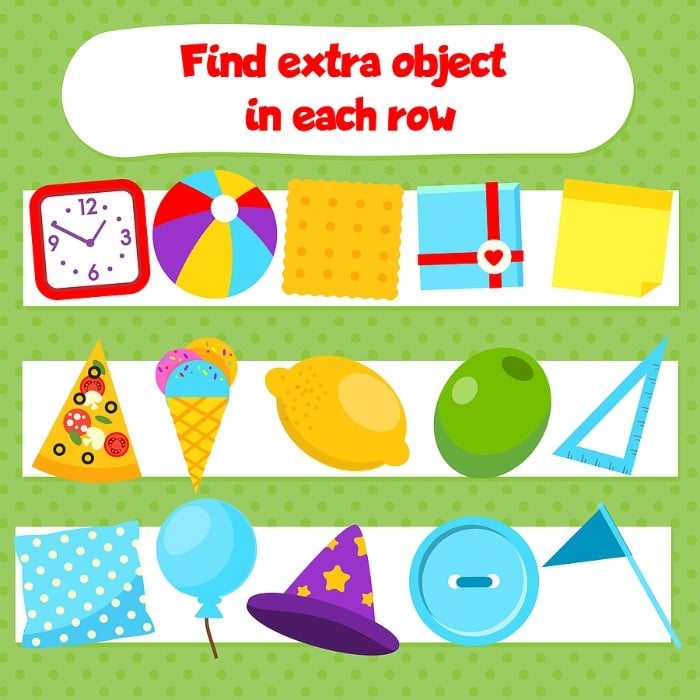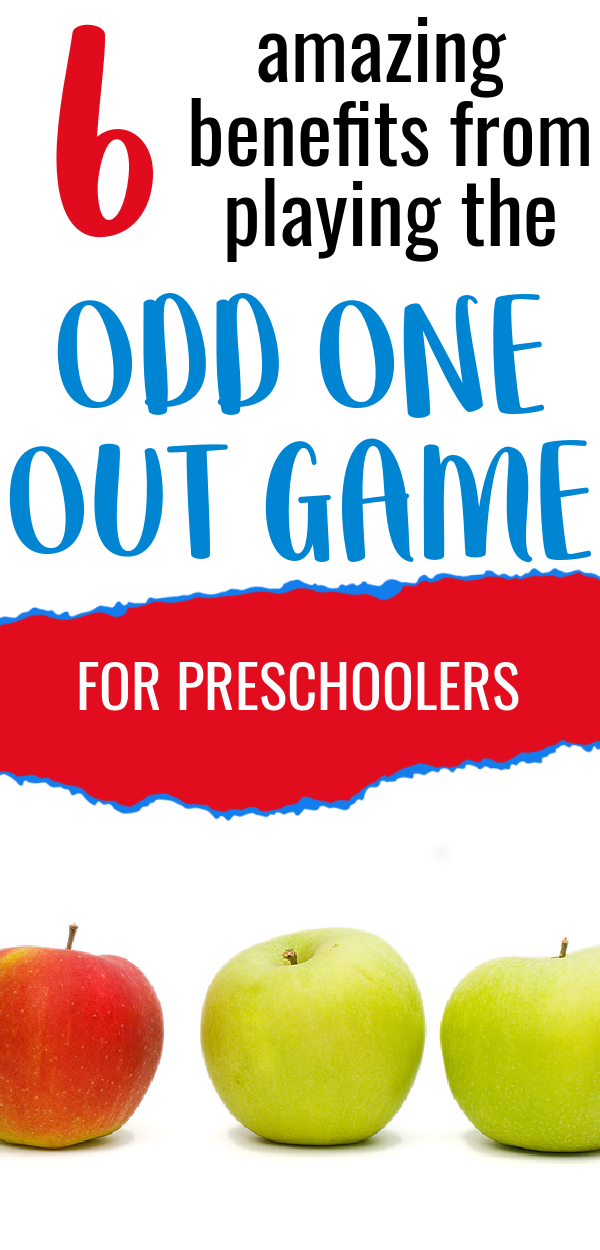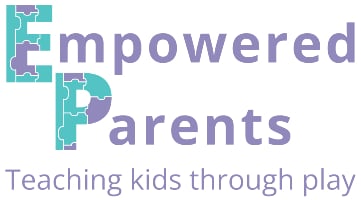Have you ever played the odd-one-out game with your preschoolers or kindergarteners?
This fun and educational game offers numerous benefits, and your kids are sure to love it.
It’s also easy to play at a moment’s notice. Grab a few objects from around the room or organize a set of words in your mind to get started!
Also called “odd man out” or “what’s my rule,” the Muppets on Sesame Street even sing a song to accompany this game: “One of These Things (Is Not Like the Others).”
How Do You Play Odd One Out?
To play, gather a set of four objects (or think of four words) and challenge kids to identify which one has different characteristics or features and does not belong with the others in the group.
For example, gather and show your child the following: a banana, a lemon, a golden delicious apple, and an orange.
Ask, “Which is the odd one out?” The correct answer is ‘the orange,’ as all are fruits, but the orange is a different colour than the others.
Ask, “Can you figure out the rule?” and see if your kids can state that the fruits must be yellow.

Children should be able to classify these particular objects by concepts they know (fruits and colours), in order to compare them.
Besides type and colour, other concepts to introduce are size, use/functionality, material and shape.
Different Ways to Play Odd One Out
Instead of using real objects, you can print or design your own worksheets with pictures or words. For the previous round of the game, for example, the sheet could show coloured pictures of the four fruits.
You can also find apps and computer games with the same types of activities.
Depending on the ages of your children and the skills you wish to address, the worksheets could also just show the words or words paired with pictures.
For example, you could show “star,” “sock,” “stop sign” and “ball.” The odd one out is “ball,” which begins with the letter “b.” The rule is that words must begin with the letter “s.”

This can also be played as a listening activity, where you say the words, “star,” “ball,” “sock” and “stop sign,” asking children to listen for the similar/different beginning sounds.
You could also use this method to practise the pre-reading skill of recognizing rhyming words. Say, “sheep,” “jeep,” “kite” and “sleep,” urging kids to identify the word that does not rhyme with the others.
Extend this by asking if they can think of other words that rhyme with “sheep,” “jeep” and “sleep.”
For younger preschoolers, don’t focus on the sounds at first as this is an advanced activity, but rather on listening for different categories, such as “monkey, bear, elephant, dolphin”.
Benefits of Playing Odd One Out with Kids
Whether you choose to play this game orally or visually, it has many benefits besides the fun of a shared experience.
Here are some of the reasons this game is educational and not just fun:
1. Critical Thinking
Playing odd-one-out encourages kids to tap into their knowledge about patterns, word meanings, language rules, differences and similarities.
They learn the skill of sorting as they identify how objects are grouped together by a condition (all are vehicles, all are round, all can be eaten, etc.) as well as how to spot an item that does not share the characteristic.
They also think about how to explain their choice verbally to the adult or to a group.
2. Listening
When playing this game orally, kids must listen carefully to hear the words being said by the leader. They also need to listen closely for any other directions such as, “Tell me which word is different and does not rhyme with the others.”
Learning to listen in early childhood is crucial and playing classic games like musical statues or broken telephone is one of the best ways to develop this skill.
Two other great ways to build listening skills in early childhood are to give children 2-step directions or to try a ‘listen and draw’ activity.
3. Vocabulary
This is a great way to build vocabulary. Children learn new words or practise words they have already been exposed to.
For example, play a round that includes the vocabulary of the seasons, such as “fall,” “autumn,” “summer” and “rain”.
Explain that “fall” and “autumn” are alternate names for the same season; although “rain” has to do with weather, it is not the name of a season like the other three.

Build vocabulary with these car games for kids.
4. Pre-Reading/Phonological Awareness
Encourage your kids to practise listening for words that rhyme and also distinguishing words with beginning sounds that match (alliteration).
In written words, they can also practise letter-sound correspondence by looking at words and listening to pronunciations.
Here are more activities to build pre-reading skills.
5. Attention/Focus
Playing fun games of any kind is a good way to build your child’s attention span.
While playing odd one out, kids need to block out other things going on around them, such as sounds from background music or the visual of fish swimming around in the tank nearby.
Their attention needs to be focused on the four things being presented to identify which one is different.
Games like Simon Says are also great for building concentration.
6. Speech/Oral Language
When children play the odd-one-out game they hear the words being said and learn how they are pronounced. They also have opportunities to practice saying the words aloud.
As an adult, it’s your responsibility to model good speech and sentence construction for your child.

Odd One Out Game Examples
Here are some ideas to get going:
Can you find the odd one out?
- Apple, tiger, cheese, cracker.
- Sailboat, canoe, jet-ski, train.
- Ball, wheel, pyramid, coin.
- Christmas, Thanksgiving, Saturday, Easter.
- Blender, spoon, microwave, toaster.
- Flashlight, circle, triangle, square.
- Sad, tall, happy, excited.
- Green, blue, red, pretty.
- Laugh, leg, hand, finger.
- Like, bike, Mike, love.
- See, eyes, bee, me.
- Hat, broccoli, coat, shoes.
- Skunk, dirty diaper, perfume, garbage.
- Little, big, tiny, small.
- Pig, pretty, pan, kite.
- Bump, trash, sash, mash.
- One, five, round, three.
- Computer, yesterday, today, tomorrow.
- 4, A, 2, 9.
- dog, bird, mosquito, butterfly.
- Comb, brush, shampoo, clock.
Starting with this list should inspire you to make up your own odd-one-out examples. Use it as a guide to practising the words and skills that your kids need most.
Odd-one-out activities for preschoolers can grow and evolve with your kids as they mature and expand their vocabularies, sound awareness and understanding of the world around them.
For even more fun, try these exciting category games next!

